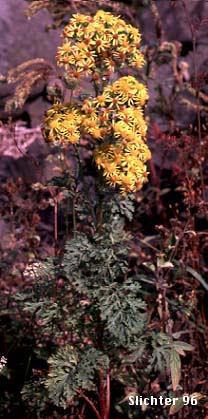[Groundsels: The Genera Packera and Senecio East of the Cascade Mountains of Oregon and Washington]
 Characteristics:
Characteristics:
Tansy ragwort is a biennial or rather short-lived perennial. The single to several stems are erect, unbranched to the inflorescence, and range from 20 -100 cm tall.The leaves are 2-3 times pinnatifid, usually 4-20 cm long and 2-6 cm wide. The lower leaves are petiolate, and often deciduous. The upper stem leaves persist, and often become sessile.
The inflorescence is short and wide, with several to many heads. There are both disk and ray flowers present in each head. The disks are 7-10 mm wide. The rays commonly number about 13, and are generally 4-10 mm long.
Tansy ragwort is toxic to livestock. It is also widespread weed across the western US which at times can be difficult to control.
Tansy ragwort is found in disturbed areas, along roads, and in grassy fields.
Tansy ragwort is a weed "imported" from Europe. It is found over many parts of the United States and Canada. It is especially bothersome west of the Cascade Mts.